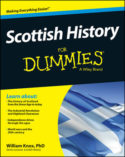
ABOUT THIS BOOK
PUBLISHER: Edinburgh University Press
FORMAT: Hardback
ISBN: 9780748624096
RRP: £85.00
PAGES: 240
PUBLICATION DATE:
March 6, 2006
BUY THIS BOOK
As an Amazon Associate and Bookshop.org affiliate we earn from qualifying purchases.
The Lives of Scottish Women: Women and Scottish Society 1800-1980
William Knox
This book tells the remarkable stories of ten women whose inspirational lives and struggles exemplify the concerns and problems that other women have faced throughout the last two centuries. Each is the subject of a chapter devoted to her particular story and the times in which she lived. The nineteenth and twentieth centuries witnessed great changes in women’s position in Scotland, and yet little is known about the achievements of the Scottish women who were the main agents of these changes. In presenting the life stories of ten women, William Knox provides evidence of the huge contribution made by women to the shaping of modern Scotland. At the same time he shows how the life histories of individuals can reveal previously dark corners of historical understanding and allow a more nuanced picture of Scottish society as a whole. Subjects include Jane Welsh Carlyle, brilliantly gifted, but married to the wayward and demandingThomas, Sophia Jex-Blake, Scotland’s first female doctor, and Mary Slessor, the ‘White Queen’ missionary. Individually their biographies are full of drama and interest.Collectively they say about much the range of women’s economic, social and political experience in the past two hundred years.
Reviews of The Lives of Scottish Women: Women and Scottish Society 1800-1980
A collection of essays focusing on the life and work of ten individuals. Some are well-known names, if not well-known lives – Elsie Inglis, Katherine, the 'Red Duchess' of Argyll; others more obscure – Eliza Wigham (anti-slavery and women's rights activist), Mary Brooksbank (Dundee radical and poet). The aim is to provide not just individual portraits of women, but to contribute to our understanding of women's roles over 200 years. The chronological arrangement of the essays means that they can be read almost as a continuous narrative, which highlights change but also underlines the persistence of patriarchal attitudes. Willa Muir (born 1890), wife of Edwin, may have had a very different life from Jane Welsh Carlyle, born 90 years earlier and wife of Thomas, but both lived in the shadow of their husbands, and suffered for it. The essays are a tale of struggle – for love, for qualifications, for opportunity, for recognition ! The particular value of these essays is that they are anchored in social, political and professional contexts, which illuminate the lives and are in turn illuminated by them. — Jenni Calder A collection of essays focusing on the life and work of ten individuals. Some are well-known names, if not well-known lives – Elsie Inglis, Katherine, the 'Red Duchess' of Argyll; others more obscure – Eliza Wigham (anti-slavery and women's rights activist), Mary Brooksbank (Dundee radical and poet). The aim is to provide not just individual portraits of women, but to contribute to our understanding of women's roles over 200 years. The chronological arrangement of the essays means that they can be read almost as a continuous narrative, which highlights change but also underlines the persistence of patriarchal attitudes. Willa Muir (born 1890), wife of Edwin, may have had a very different life from Jane Welsh Carlyle, born 90 years earlier and wife of Thomas, but both lived in the shadow of their husbands, and suffered for it. The essays are a tale of struggle – for love, for qualifications, for opportunity, for recognition ! The particular value of these essays is that they are anchored in social, political and professional contexts, which illuminate the lives and are in turn illuminated by them.
William Knox
William Knox is Senior Lecturer in Scottish History at the University of St Andrews. K is the author of Hanging By a Thread: the Scottish cotton industry, c.1850-1914 (Carnegie, Preston, 1995); James Maxton (MUP, 1987); Scottish Labour Leaders, 1918-1939: a Biographical Dictionary (Mainstream, 1984); and Industrial Nation: Work, Culture and Society in Scotland, 1800-Present (EUP, 1999).











